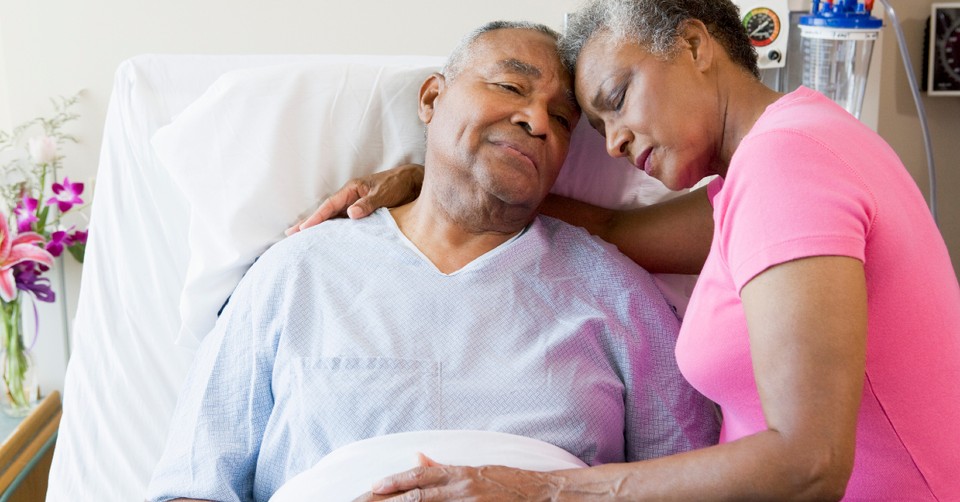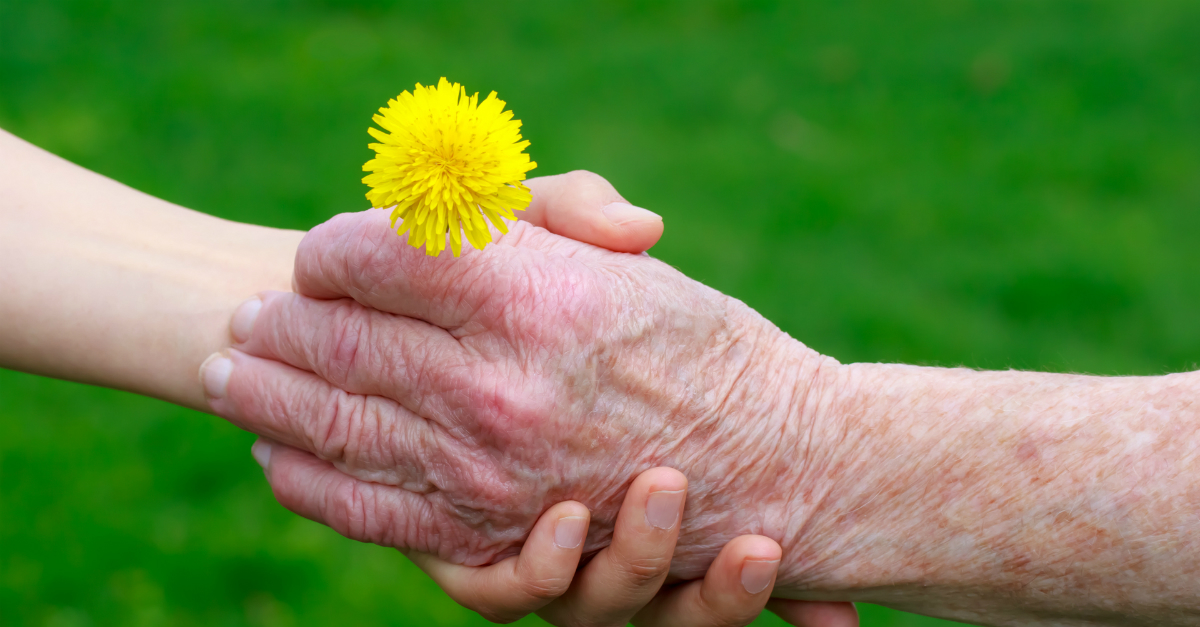How to Love Your Spouse through Chronic Illness

When we’re young, most of us think the only people who have to deal with a chronically ill or disabled spouse are older folks.
We live our lives on the fast track, and rarely stop to think about the prospect of aging, never mind getting sick with some dread disease. Our schedules with children, jobs, church activities, and volunteer work keep us on the run.
Vacation ideas and plans await execution next summer, or we pore over house plans for the house we’ll build as soon as we retire. All these things consume our thoughts. Until they don’t.
One phone call can change everything.
The doctor says it’s cancer. The officer says there was a car wreck and you need to get to the hospital because your wife is in critical condition. Your husband picked up his fork at dinner last night and didn’t know what to do with it. This confirms what you heard the doctor say about his dementia.
You go into shock at first—thinking this can’t be happening. But reality surrounds you and settles like a fog you can’t see beyond. Then fear crouches in the pit of your stomach.
In the blink of an eye, your life is turned upside down. This was not how life was supposed to go.
You were supposed to stay healthy until you rode into the sunset on a golden pony. Or at least you and your spouse both wanted to live strong and grow old gracefully—together.
Nobody plans to become chronically ill or disabled. And most don’t plan to be the primary care-giver when it happens to the one they vowed to love until death.
As a pastor’s wife, I’ve watched many couples face these kinds of scenarios. As a cancer survivor, I’ve experienced the life-altering phone call myself—and my husband became my caregiver.
And when my mother became too ill with dementia to stay in assisted living, I cared for her in our home until her death. All of these instances have propelled me to reach out to others when the life they’ve worked so hard to build suddenly disappears in a poof of illness, or slowly deteriorates into a cloud of confusion.

Photo Credit: ©GettyImages/LuckyBusiness
In Sickness and in Health
Most traditional marriage vows include the phrase, “in sickness and in health.” But what if the sickness is worse than you bargained for?
In the first hours or days after a condition becomes known, friends and family all promise prayers and support. But as the days move into weeks, most others get caught back up into their own lives. The suffering couple recedes to the back of their minds.
I recently spoke to a young woman who found out she has cancer. She said it seems like she’s frozen in time while everyone else is running around oblivious to her situation. This is often because most people just don’t know what to say or do.
So they back away. You need to grant them grace, but you’re still needy. What should you do?
Pray
No one understands like Jesus. The Bible tells us that He suffered in every way that we do. No, He wasn’t married, but He understands all kinds of suffering. He carries our grief and comes near when we call out His name. Sometimes when I can’t get any other words to form, I just say “Jesus” out loud.
Instantly that knot in my stomach unwinds a bit. Many times my mind fills with Bible verses I’ve memorized, sermon topics I’ve heard, lessons I’ve studied, and/or songs I know.
Then I am able to face my situation with creativity and grace.
But don’t pray alone. Create a tribe of prayer warriors. Choose a few friends who you know will intercede every day on your behalf, and keep them up-to-date on what you need them to pray about.
I am part of a 3-way text thread with two of my prayer warrior friends. We draw near in times of crisis, but this way of staying in touch daily has cemented our relationship and grown our faith.
Read Widely
Search trusted internet sites such as breastcancer.org or alz.org for information on the illness or disability your spouse faces. Look to your favorite book retailer for resources.
It’s probable somebody wrote a book about the very situation you’re in. A couple of good examples are Still Alice by Lisa Genova, a book that was made into a movie about a woman with Alzheimer’s, and When Your World Falls Apart by Dr. David Jeremiah.
Read the Bible. Its pages are full of encouragement and promises. If you need help knowing where to find these verses, a concordance app such as Strong’s can point the way.
Phone a Friend
Most of us have one friend we know we can call in any crisis. This is the one who will stick by you no matter what, is a sounding board when you need to vent, will come over day or night, and who will keep what you say in confidence.

Photo Credit: ©GettyImages/Melpomenem
Love Your Spouse as You Love Yourself
When Jesus said to love others as we love ourselves, I think He knew we must invest something in ourselves in order to be able to invest in others. At no other time is this principle more valuable than when we take on the role of primary care-giver. How can we do this?
Work on a Project
I know one woman whose husband has Alzheimer’s and she quilts. Quilting has been her passion for years, and when her husband became ill, her fabric room became her haven.
Another friend loves to read. One of my cousins searches out our family genealogy, and now that she is a caregiver, this pursuit provides “recess” for her mind. Still another friend loves to paint, finding refuge in her art studio.
Work at a Job
Sometimes the financial burden of medical care necessitates either retaining a current job, or finding a new one.
A man in our church who cares for his chronically ill wife moved to be near their daughters and then, although officially retired, he got a part-time job at a call center. A home health provider cares while he is at work, and he is able to continue earning income.
Even if the money is not needed, a part-time job can be beneficial for mental health purposes.
Find Respite Care
A week without the heavy responsibility of caring for your loved one can refresh not only your body, but your mind. Home health and hospice agencies offer this service.
Besides spending a week away from full-time caring, a few hours can be arranged either informally through your family or circle of friends, or formally through your church or an agency.
A volunteer will babysit while you attend Bible study, go shopping, or out to lunch with a friend.
Take One Hour Each Day for Yourself
Whether it’s a long bath at the end of the day, a walk around the backyard in the early evening, or a mid-morning workout, any short activity can mentally carry you away
If you feel you’re not getting enough exercise, try to make this the time for it. Conversely, if you feel exhausted, aim for a relaxing activity. Perhaps a combination is best—a 30-minute daily walk outside, combined with a bedtime soak.

Photo Credit: ©Sparrow Stock
The Importance of Church Community
There was a day when extended families lived near one another. I read a recent article by David Brooks in The Atlantic titled, The Nuclear Family Was a Mistake. His premise is that when extended families stopped living in close proximity, and the norm became two parents and their kids, everyone suffered.
When we could rely on family to help in times of crisis, or over the long haul of physical decay, we felt more secure and able to handle the situation. We knew we were not alone.
Raising kids was a group effort, and caring for the infirm was, too. But those days are long gone.
Where can we go for the kind of support we need? The answer is the local church.
My husband and I sometimes honestly observed that our church family felt more like family than our relatives.
While I fought cancer, it was our church friends who supplied the meals I couldn’t cook, cleaned our house when I was too frail, and even ironed his shirts. These people prayed for me and the deacons prayed over me.
Some of the men simply sat over coffee with my husband and listened. He needed to keep working full-time, and our church made it possible for us to get through that season.

Photo Credit: ©Unsplash/Joe Hepburn
What About Your Spouse’s Needs?
While physical needs can take over in what is often termed the tyranny of the urgent, your spouse does have other needs you can meet.
Companionship
Companionship and tender loving care become a beautiful expression of love. Simple conversation takes on a new importance. Even when mental clarity prevents conversation, the act of cooking breakfast and spoon-feeding if necessary expresses far more than words.
One of our friends at church cared for his wife for years during her decline from Parkinson’s disease. His gentle ministrations spoke volumes about his love for her. His example is one we all can follow if the need arises.
Verbal Prayer
Even if the ill person does not appear coherent, speaking prayer over them carries power. The Holy Spirit ministers to everyone who hears these prayers.
And He answers heartfelt cries for comfort, grace, and strength. Often, the sick person will begin to breathe easier and their muscles will relax a bit afterward. And if they are aware, the effect cannot be overstated.
Encouragement
By utilizing the tips above, you can maintain a positive, encouraging attitude.
Grief and crying spells still happen, but you will be undergirded by the ministry of the Holy Spirit expressed through Scripture, prayer, friends, family, and care agencies. He will provide the resources necessary.
Your loved one needs encouragement from you. He may be unable to focus on anything beyond the pain or fog of confusion. But you can make all the difference by your attitude.
I heard a returning wounded veteran say he was prepared to die in battle, or come home a hero. But he was not prepared for the in-between. Loving your spouse until death do you part means loving through the in-between.
This is where true love can find its greatest expression. Whatever resources you need to pull in, your provision for your spouse conveys love. Providing appropriate care looks different in each individual case. But when it comes from a heart of love, you can’t go wrong.
Photo Credit: ©GettyImages/Monkey Business Images
Kathryn Graves, author of Woven: Discovering Your Beautiful Tapestry of Confidence, Rest, and Focus, and Fashioned by God, holds a BA in Psychology, is a pastor’s wife and Bible teacher, and spent 15 years in the fashion industry. Kathryn is Mimi to five grandsons, and loves to play with color—including interior design, clothing, and painting with pastels. In addition to her website, find her on Facebook, Instagram, and Twitter.
Originally published March 30, 2023.





